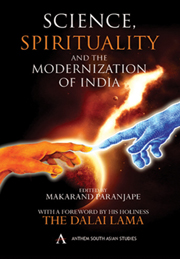Book contents
- Frontmatter
- Contents
- Notes on Contributors
- Foreword
- Editor's Preface
- I Science and Spirituality: East and West
- II Coming to Terms with Science: Some Change Agents
- CHAPTER 3 Sir Sayyid Ahmed Khan and the Modernization of South Asian Muslims
- CHAPTER 4 Acharya Jagadish Chandra Bose: Looking beyond the Idiom
- CHAPTER 5 Sri Aurobindo and Krishnachandra Bhattacharya on Science and Spirituality
- CHAPTER 6 Chaos, Complexity and Emergence Mechanisms: Spiritual Evolution in Sri Aurobindo and Teilhard de Chardin
- CHAPTER 7 Science, Spirituality and Swaraj: Towards a New Aesthetics of Ethical Existence
- III Building Bridges: Evolution, Consciousness and Healing
- IV Science and Spirituality: Culture, Society and Gender
CHAPTER 7 - Science, Spirituality and Swaraj: Towards a New Aesthetics of Ethical Existence
from II - Coming to Terms with Science: Some Change Agents
Published online by Cambridge University Press: 05 March 2012
- Frontmatter
- Contents
- Notes on Contributors
- Foreword
- Editor's Preface
- I Science and Spirituality: East and West
- II Coming to Terms with Science: Some Change Agents
- CHAPTER 3 Sir Sayyid Ahmed Khan and the Modernization of South Asian Muslims
- CHAPTER 4 Acharya Jagadish Chandra Bose: Looking beyond the Idiom
- CHAPTER 5 Sri Aurobindo and Krishnachandra Bhattacharya on Science and Spirituality
- CHAPTER 6 Chaos, Complexity and Emergence Mechanisms: Spiritual Evolution in Sri Aurobindo and Teilhard de Chardin
- CHAPTER 7 Science, Spirituality and Swaraj: Towards a New Aesthetics of Ethical Existence
- III Building Bridges: Evolution, Consciousness and Healing
- IV Science and Spirituality: Culture, Society and Gender
Summary
PRASTAVANA (INTRODUCTION)
Gandhiji's vision of life unmistakably shows a remarkable blend between the scientific (avidya) and the spiritual (vidya) aspects of knowledge – the interdependence and mutual inclusiveness of which is characterized by the centrality of truth and non-violence (satya and ahimsa) in Gandhiji's theory and praxis for ethical existence. For Gandhiji, science and spirituality have to be yoked together within an ethical framework of values to usher in the beautiful in human life. His holistic vision of life was, therefore, grounded in a new aesthetics of moral existence.
My uniform experience has convinced me that there is no other God than Truth. To see the universal and all-pervading spirit of truth face to face, one must be able to love the meanest of creation as oneself. And a man who aspires after that cannot afford to keep out of any field of politics, and I can say without the slightest hesitation, and yet in all humility, that those who say that religion has nothing is do with politics do not know what religion means (Gandhi, 2003, p.463).
Even if ‘politics’ in the preceding statement is replaced with ‘science’, the overall ethical import of Gandhiji's vision will remain intact and unaffected. In other words, in the Gandhian world view 136 Science and Spirituality a scientist and a spiritually motivated seeker will both pursue Truth – the former does so in order to maximize human comfort, happiness and abolish external pain and miseries; the latter does so in order to experience the spiritual oneness or unity of being through ahimsa, Swaraj (self-rule) and satyagraha (soul or truth force).
- Type
- Chapter
- Information
- Science, Spirituality and the Modernisation of India , pp. 135 - 146Publisher: Anthem PressPrint publication year: 2009



